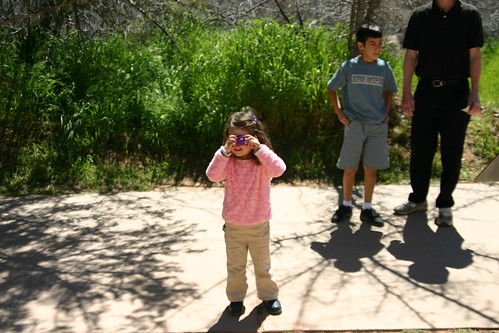I went to the Library of Congress recently to hear distinguished scholar and child-development expert Edith Ackerman discuss “The Anthropology of Digital Natives”.
Digital natives are defined as people who grew up with the Internet – basically K-12 students. Interestingly, one point Ackerman made was that what we consider “technology” are the things we didn’t grow up with. For digital natives, the Internet is not complicated technology but is just a normal tool.
While I’m a “digital immigrant” instead of a native, I did somehow manage to take notes on my iPhone during the talk, which I’ve expanded upon here.
With every new wave of technology, kids readily adopt it while older people hold back. They grab hold of what’s new and make it their own.
K – 12 is the first digital generation, and spends hours each week gaming and using computers The educational system they’re in was designed for a print generation, not a digital one.
Literacy must be redefined as encompassing all media, not just reading – beyond print. Digital natives Google instead of going to the library, make a video instead of writing a paper – these are new, hybrid ways of being an author. Rather than starting from scratch, they capture, collect and share. This is done in ways that are often considered plagiarism, like the author who borrows text from Wikipedia or copyrighted content from YouTube.
Kids must learn new relationship skills and a sense of self in a world of multiple identities (MySpace vs real life). Kids love navigation games and the return to home – these are archetypal myths.
Four traits of digital natives:
- Shareism – co-creation rather than individual authorship
- Border Crossing – private is public (like Facebook), kids belong to multiple tribes, have multiple identities
- Media Literate – borrow from others with copy and paste, read/write combining (like a wiki), everyone is an author
- Expect Tools to Be Easy – everything has an undo button
This lecture was part of a series at the Kluge Center of the Library of Congress. Here’s upcoming lectures and more information.
Monday, May 12: “Internet, the Private Mind?” by Steven Berlin Johnson, author of “Everything Bad is Good for You.”
Monday, June 23: “The Anthropology of YouTube” by Michael Wesch, assistant professor of cultural anthropology at Kansas State University.
Monday, June 30: “Open Source Reality” by Douglas Rushkoff, author of “Screenagers: Lessons in Chaos from Digital Kids.”
For further information on the Kluge Center, visit www.loc.gov/kluge/.

One thought on “Library of Congress Lecture on Digital Natives”